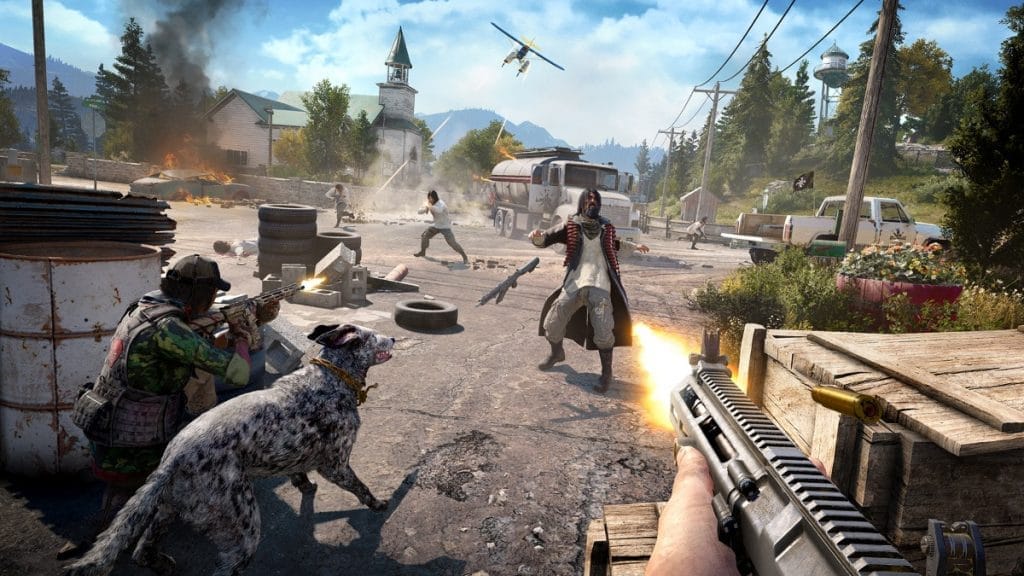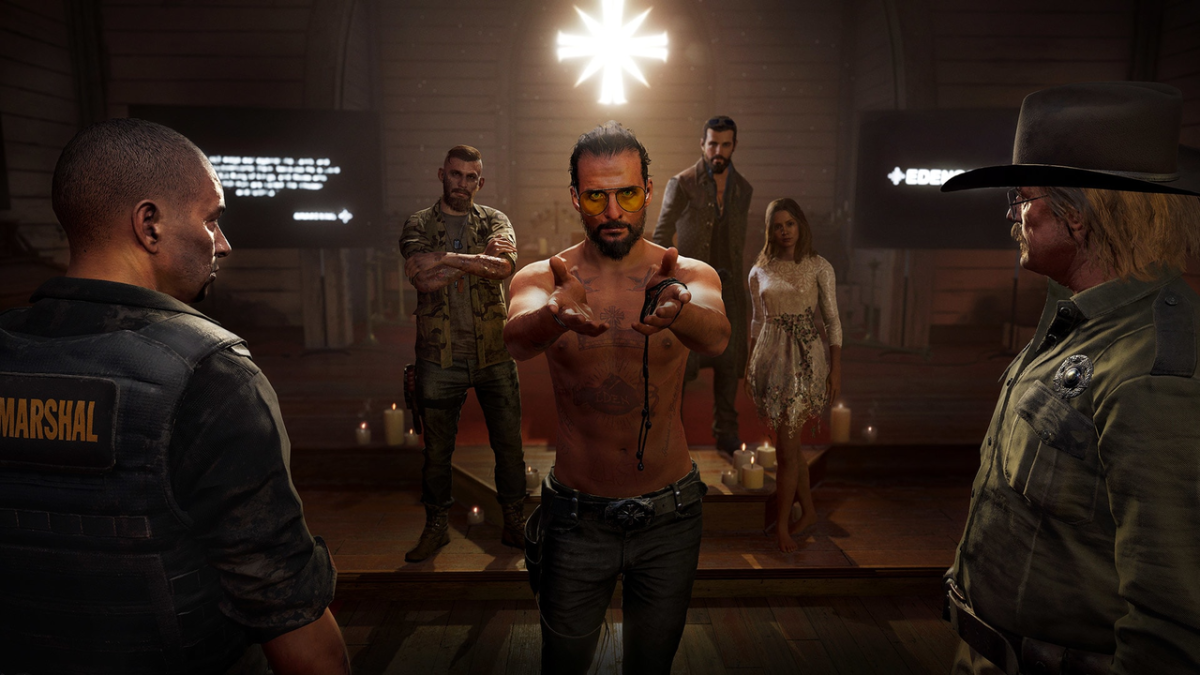In the beginning, Ubisoft created Hope County, Montana. Then Ubisoft said "Let there be light, and let there be darkness" and Ubisoft called the light the Resistance and the darkness Ubisoft called the Project at Eden's Gate. And Ubisoft said "Let the waters swarm with swarms of 'fishes' and let the game bring forth all sorts of living creatures for players to obliterate" and it was so. And Ubisoft said "Let us make NPCs in our own image, albeit with highly exaggerated mannerisms, and let them bond with the player through story and dialogue and interaction" and, behold, it was very good. Thus, Ubisoft created a game where the player is let loose upon a religious cult in the middle of the United States, and called it Far Cry 5.
Of course, as with all tales of creation, things aren't quite as perfect as one would hope. In Far Cry 5's case, while the vast majority of the game can be thought of as the next step for open world gaming, the narrative elements can be a bit lacking, to put it mildly. By now, you may have heard of how Far Cry 5 handles story progression even if you just picked up the game. Aside from the introduction and tutorial segment, the player is more or less left to their own devices. However, by virtue of merely playing the game (unless, for whatever reason, you only play Far Cry 5 for the fishing mechanics), you will eventually trigger a capture sequence where your character is captured by Eden's Gate and subjected to a grueling series of monologues by one of the major cult leaders, or Heralds. While you do get a bit of a warning, this capture sequence cannot be avoided and it can happen no matter where you are. You can be flying a plane, or exploring some cave in the middle of nowhere, or even sitting in a friendly outpost surrounded by Resistance fighters and yet, purely because the game says so, you will be captured by Eden's Gate. You get captured, the story progresses, you escape, and then you get captured again and again (this will cause some quests, even the main ones, to outright disappear), perhaps one of if not the worst possible way for any open world game to handle story progression.
Putting aside the obvious absurdity of how your character can apparently be captured for weeks on end despite being able to mow down hundreds of fanatics and dangerous animals without so much as a second thought, such capture sequences really highlight a major, glaring flaw with Far Cry 5- your character is mute. A more accurate description might be that they're completely incapable of communicating in any way whatsoever even though it might've saved the life of at least one NPC. At first, it's not that much of an issue. Then, as the capture sequences ramp up in frequency and duration, you may start to notice that the Heralds just love to hear themselves talk. Eventually, you may even feel like two completely different teams worked on Far Cry 5's story. On one hand, there's all these wonderful characters that, even if they are a bit one dimensional, are generally quite interesting (try bringing any two human followers along on a roadtrip and they'll reveal quite a bit about themselves to each other). On the other hand, there is almost no way that anyone would think that it would be a good idea to yank the player away from what they are doing so that they can be subjected to several minutes of one sided dialogue. Plus, a story needs conflict to be compelling, and because there is never any clash of words or ideas between your character and the Heralds, you never really get a chance to view any of the Heralds as anything more than your next target.
It would be fairly safe to say that no one expected Far Cry 5 to be the pinnacle of storytelling, but the fact that the game features a mute protagonist in a story where you cannot afford to take away the player's voice is mind-boggling. Perhaps Ubisoft could've gotten away with having a mute protagonist in the other Far Cry games, but Far Cry 5 takes place in a land where rugged individualism, patriotism, and freedom are the pillars of culture. Indeed, it seems rather doubtful that the game would've gotten the attention that it did if it weren't for the setting. That any American, nay, human being, would stay silent fighting a force that is so comically evil on home soil seems incomprehensible. After all, you aren't simply trying to fight for your life, you are fighting for your way of life, your freedoms, and the Dream that we all dream of, yet the NPCs are more human in this regard than the character that is supposed to represent the player.
SPOILERS AHEAD

Amusingly enough, all could've been forgiven if it weren't for Far Cry 5's ending. The mute protagonist, the borderline deus ex machina nature of Bliss, the jarring gameplay interruptions that lead to rather tedious dream/hallucination segments, these things pale in comparison to the excellence that is the rest of Far Cry 5's gameplay, which is saying something as almost any other game would be crucified for making such mistakes (see also Destiny 2). Instead, the writers seemingly got ahead of themselves and literally nuked the player's ability to connect with, well, everything. If there was some thought provoking moral to be learned from this plot twist, then it's that nothing that you do ever matters because at any point, death may just come knocking on your door. Either that or some cultists will brainwash you when you try to show mercy and restraint.
True, Joseph Seed turned out to be correct about the end of the world, but where does that leave the player? No matter which ending you get, of which there are technically three, all the people that you met and love die and whatever you did to dismantle Eden's Gate and build up the Resistance was pointless. Ironically, a voiced protagonist would've been able to soften such a narrative blow with some touching final thought. It could've even made the annoying capture parts tolerable, as it would explain why the player isn't putting up a fight when the Heralds are busy talking at you. But by providing players with a mute protagonist, Ubisoft gave people a blank slate to project themselves onto even though every major plot point forces a completely different behavior onto you, robbing players of their agency, their individuality.
Perhaps even more amusing is the fact that Ubisoft had the perfect chance to have their plot twist ending without making it seem like the player's efforts were for nothing. At least one of Far Cry 5's NPCs is a government agent who is communicating with the outside world, so it's not like the United States is totally blind to a small rebellion in their own backyard. Another NPC is a stereotypical conspiracy theorist who, while he may not be the most eloquent individual, turned out to be relatively knowledgeable of Eden's Gate. By themselves, their stories mean little to the overall plot, but Ubisoft could've tied the two together by making Hope County a testing ground for some kind of combat stimulant, i.e. Bliss. It would certainly explain how no one outside of the county was doing anything about a cult that had its own small air force, heavy weaponry, and access to a few old nuclear missile silos.
Or even more simply, show how the Resistance or the Rookie, thanks to their isolation from the outside world during their hour of need, became increasingly violent and militaristic to the point that they ultimately became a fallen hero of sorts when help finally does arrive. It's certainly not as dramatic as the actual ending, but at least there would be something to think about- would one risk turning into the very thing that Eden's Gate branded them as, unbridled Wrath, in the name of justice, or does one turn a blind eye to injustice for the sake of personal salvation? If Ubisoft wanted to dive into really controversial territory, they should've removed the Bliss containers from the last fight and replaced the nukes with the more supernatural biblical disasters (i.e. fire and brimstone raining from the skies, locusts, resurrection of the dead, etc.). In doing so, Joseph's claims about being favored by God are given some legitimacy rather than merely appearing to be the one doomsayer who just happened to be right. This gives players a chance to ask the question "If there is a God, must He be benevolent?" Needless to say, this is a far more loaded question than whatever it is the original ending is supposed to inspire the discussion of. At the same time, it removes any ambiguity that comes with the use of Bliss as a narrative device.
Don't be mistaken, no one has any gripe with how Far Cry 5's ending is dark. Playing though a game and losing isn't some new concept, but it is something that must be executed flawlessly to prevent players from feeling cheated. It certainly can't be an ending that isn't the culmination of any characters' actions, nor should it rely upon the unrealistic or unprecedented inaction of the player character. As it stands, Far Cry 5 could've concluded with an asteroid hurtling towards Earth or aliens or some other absurd apocalyptic event and the end result would've been the same. The problem instead lies in how other games, even other Far Cry games no less, can pull off a dark ending that doesn't both invalidate a player's progress and feel like something that the writers pulled from what may as well be out of nowhere. While the rest of the game is worthy of praise, the stark contrast between the story and everything else is so distinct that it may as well be described as amateurish. That Far Cry 5 touches on such relatively heavy topics while still relying on a mute, robotic protagonist is nothing less than, frankly, gross sloppiness.
Have a tip, or want to point out something we missed? Leave a Comment or e-mail us at tips@techraptor.net













